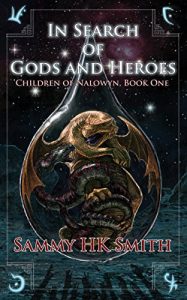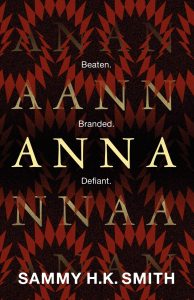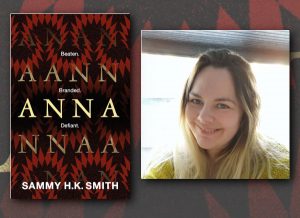Interview with Sammy H.K. Smith
Today the Hive is joined by Sammy H K Smith whose debut novel Anna came out from Rebellion publishing last month.
Sammy H.K Smith lives and works in Oxfordshire UK as a police detective. When not working she spends time with her children, husband and pets, renovates her house, and inadvertently kills plants. A keen writer and lover of all things science fiction and fantasy, she’s often found balancing a book, a laptop, a child, and a cat whilst watching Netflix.
Thank you for coming to talk to the Hive. Your journey into published author is somewhat unusual in that you started out as a publisher, with the small press Grimbold Books – voted Best Independent Press in The British fantasy Awards 2017.
Can you tell us a little bit about how you got started with Grimbold, and why you decided to start with publishing rather than with writing?
Well, I actually did start with writing. Way back when there was a site called Authonomy run by Harper Collins for aspiring writers to share their manuscripts and get feedback. I updated my works-in-progress and met a lot of friends on the site, and in particular, Zoë Harris. I finished off my first novel and subbed it out to several places. I had some offers from small presses and made it super close to the acquisitions table for a well-respected SF&F press (alas, no deal though in the end), and thought about self-pubbing to retain more control and freedom. Zoë and I decided to work together and create a publishing company and invited a few authors in and it grew from there…
Grimbold sets out to publish the very best in science fiction, fantasy and dark fiction. What drew you as a publisher to specialise in those genres?
Our personal love for genre fiction. I don’t think we could have worked with as much passion as we did if we didn’t enjoy the content! What we both love about SF&F is that it’s constantly evolving and ‘bettering’ itself – more inclusivity, more diversity, more of everything that makes it so wonderful. There are so many sub-genres to work with as well. I’m like a kid in a sweet shop!
Oh yes I absolutely agree – spec fiction definitely has that power to trailblaze issues and normalise discussion of neglected or repressed topics.
We wanted Grimbold to become a platform for authors to showcase their work, and eventually lead on to bigger things.
It’s important to us that we take chances where perhaps bigger presses might not. A few of our authors we mentored extensively, working for months to get the manuscript just right and help them expand their ‘writing toolkit’ of skills. It’s not something we can do for everyone, but if we see promise in the writer and the work, it’s very rewarding.
 Dark fiction isn’t a genre that I’d heard of before seeing it on Grimbold’s website, but a quick google through up this definition “Dark fiction describes fiction that contains horrific elements, but may fall outside the standard definition of horror literature.” And that definition certainly describes your debut, Anna. Which I suppose raises the question, why did you strike out for a different publisher, rather than use your own press?
Dark fiction isn’t a genre that I’d heard of before seeing it on Grimbold’s website, but a quick google through up this definition “Dark fiction describes fiction that contains horrific elements, but may fall outside the standard definition of horror literature.” And that definition certainly describes your debut, Anna. Which I suppose raises the question, why did you strike out for a different publisher, rather than use your own press?
The million-dollar question.
I have utter faith in Grimbold, but ultimately it felt that publishing under our own imprint would feel a little ‘vanity’ to me. I was more than happy to do it with my first novel, In Search of Gods and Heroes, as we were a small press gathering momentum. After becoming a bit more established and winning the BFS award I (personally) felt that using Grimbold was a little unfair. I needed validation outside of my own little bubble.
I’ve recently attended an online masterclass from Juliet Mushens about finding an agent and being an author about to debut must be an exciting time. How did the process of submission letter, getting an agent and getting a publisher work out for you?
Well… I’m still un-agented. I submitted the traditional way and got some positive interest from an agent, met with them in London, and then they asked how I felt about making the novel YA and a love story. Which would have destroyed the entire themes of the novel.
[Editor: *slow blink*]
I shelved ANNA for a few years after that. Re-subbed, rejected, and then was asked to submit to Rebellion and there we go… It is a HUGE confidence killer getting so many rejections. The feedback was all excellent, but the same: ‘we don’t know how to pitch this’.
I’m over the moon to be with such a forward-thinking and inclusive publisher though, and I’m incredibly excited that Rebellion took a chance on my book that doesn’t really fit into any boxes or moulds.
One thing Juliet suggested when pitching a book to a publisher or agent, is to have in mind two comparator books to help the recipient place the book against some benchmarks. Did you have any comparator books you used when pitching Anna, and if so what were they?
Well, I went for ‘The Handmaid’s Tale meets The Road’ and I think that’s a good comparison. I say this with no ego, but it is ridiculously hard finding anything quite like ANNA on the market, and that links in to how difficult it would have been for the agent to sell.
Anna is unquestioningly dark and this might be a good point for you to share some of the trigger warnings about the book’s content.
ANNA is the story of a woman trying to survive in a dystopic world where violence and self-service strives. She is caught by a man who physically, sexually, emotionally abuses her and the story is her journey through the PTSD of the abuse while she tries to rebuild relationships. The novel is broken into three parts and each one is different in tone and feel.
OK, so it has themes of rape and abuse. Within the Fantasy Hive team we often have discussions about how rape is sometimes used as a trope or plot convenience – e.g. the dark past that has motivated the protagonist to train for revenge. Fortunately I think authors are moving on from that. I think speculative fiction has always been a bit of trailblazer in anticipating shifts in societal attitudes – in spec-fic after all, we portray worlds that could be, rather than worlds that are. What was your own rationale or motivation for writing Anna – a victim of rape and abuse in a post-apocalyptic future?
If anyone has seen my posts before, they know I’m passionate about sexual and domestic abuse. I’ve spent nearly my entire career focused in the field of protecting vulnerable people and I loathe seeing the rape trope you mentioned. I know that a lot of people read to escape the cruelties of our world (including me!) but I wanted to see what our spec-fic genre offered in terms of sexual violence and the portrayal of survivors. I found several novels that covered childhood sexual abuse and the PTSD and emotional journey thereafter, but couldn’t find anything that fit my work.
I did initially start ANNA with the intention of it being a lot more light-hearted and mainstream, but the further I got, the further I realised I couldn’t write her any other way than how I’ve witnessed this abuse affect people.
Your day-job as a police officer has involved working with victims of domestic violence and abuse. How far were you able to draw on this experience, and how far did you do additional research to bring Anna’s experience to life?
ANNA is an embodiment of so many of the survivors I’ve worked with. I didn’t use any of their stories or experiences – as I think to do so would be a gross violation of their privacy and be pretty exploitative – but the psychological mindset was something I did tap in to and the intense claustrophobia and heightened awareness felt at all times, and how emotions can flit all over the place.
I’m keen on the psychology behind abuse, and follow Zoe Lodrick’s blog and papers on the matter. Zoe often hosts training days and seminars for police and helps us break away from our unconscious bias on ‘expectations’ of survivors in those situations.
In the last few years we have seen with the Me Too movement and elsewhere a flood of stories about powerful men using their position to abuse women, and women – many of whom have been silent, or silenced, for years – reluctant to come forward because of the trial by media that they face.
 However, in Anna’s case there is no media anymore, so why does your protagonist find it so difficult to share her past once she does get to a place of safety? And how far does that reflect the challenges abused women face in contemporary society?
However, in Anna’s case there is no media anymore, so why does your protagonist find it so difficult to share her past once she does get to a place of safety? And how far does that reflect the challenges abused women face in contemporary society?
She’s ashamed. She’s scared. She’s alone. She’s wary and untrusting. She’s living in a world where violence and brutality thrives and once you show weakness – you’re fair game to the monsters who would exploit you.
ANNA has her own backstory that we learn snippets about during the novel, and like so many, forming relationships is hard. The trauma of what she’s been through makes verbalisation difficult, and just as she’s starting to trust in a few people, her past catches up with her.
A mini-spoiler ahead: her abuser integrates himself into her life and inner circle, making it impossible for her to open up about what happened. This is something I’ve seen so often – the perpetrator will appear to the outside world as the most wonderful and supportive person, but behind closed doors the mask slips and the controlling narcissism is released.
Anna’s world has slid into dystopia without the conventional spec-fic trope of plague or nuclear holocaust. What inspired you to imagine this different way that the world we know might collapse and also how it might be refashioned into townships with the lawless unlands between them?
One of the biggest criticisms so far of ANNA has been my lack of detailing how the world ended. I stress to add that this is deliberate. I didn’t fill the book with the story of the world wars as Anna herself is the world I want the reader drawn into and didn’t want to dilute her story or the emotional impact.
However, with the end of the world I was absolutely sure I didn’t want anything nuclear. I don’t believe we, humankind, will ever use nuclear weapons and I researched the MAD doctrine which cemented that belief!
I thought about natural resources such as oil and food sources, the economical motivations, and then the rise in far-right groups and far-right politicians in positions of power and how selfish we are as a human race and worked on the notion that individual countries would start fighting one another in different conflicts for power plays and acquisition of resources, slowly sucking other nations in as the knock-on effect to the stock markets, supply chains etc started kicking in.
Being cruel, I had the first bombs on Anna’s country a strategized wave. Hospitals, schools, military stations and locations of importance (telecoms, government buildings) first and once the country was in disarray, randomised attacks. This led to people forming gangs to protect themselves and gave the underground of society the opportunity to flex their muscles.
Might is right, survival of the fittest, and power in numbers became a little mantra of mine, and the towns were formed. The power shifted from local governments to local gangs and criminality. I’ve got more of this in the book I’m working on at the moment, so stay tuned!
One thing I think comes across very clearly with Anna is how the abuse of her is about power and control rather than sex. Rape has often been used as a weapon of war or of psychological domination. I think this also comes across in how you treat her attacker’s attempts to be a “solicitious lover.” However, that behaviour might create some confusion for readers. Did you find it difficult to address that complexity of the power dynamic in abusive relationships?
I think it’s really difficult. I absolutely stress that what I write does not make me the arbitrator in all abusive relationships. It offers one survivor’s possible reaction to the circumstances.
I wanted to show that narcissists often view themselves as the protector, the good ones, the hero if you will, and my abuser truly believes that he can protect her and thinks he loves her… It’s clear though that he’s actually more interested in domination and there’s a scene near the end of part one where he shows Anna just how much control he has over her, which is humiliating and chips away at the small amount of strength she has left at that moment in time. It makes for grim reading but it was necessary I think.
In our current climate we are seeing heightened discussions about the behaviour of men, the vulnerability of women, and even some discussions around the language the media use to portray women as passive recipients of “violence against women” rather than talking about the perpetrators of that violence. How far do you feel Anna is a product of its time, and how do you hope it might contribute to those discussions?
This is a brilliant question. I abhor victim-blaming and sadly it’s still all too common. What I wanted to write was something that showed that strength comes in many forms. Not every victim can physically fight back, or even tries to fight back. That’s normal. I want to dispel the myth that ‘I wouldn’t do that. If I was attacked, I’d scream, I’d fight, I’d do X Y Z’. The truth is, we don’t know how we would behave and whether our amygdala side of the brain would kick in.
If you choose to protect your life by freezing, or by befriending your abuser, that does NOT make you complicit in what has happened. The onus is always on the abuser – not the victim. This is a message I wanted to make clear. Though Anna often blames herself, it was never her fault and the reader will hopefully take this message (and others) away as well.
As many reviewers have noted, its themes make Anna a challenging book to read. However, it is also a rewarding one, given the fidelity you show to the victim’s experience, while still giving Anna the agency that the reader so wants her to have. Which part of the book gave you must pleasure (or satisfaction) to write?
Really difficult one. I think it was a mix of certain actions in part three where we start to see Anna gather her strength and assert herself. Small things that helped build her back up and take control of the situation. She is able to put into words what happened to her during a scene on the beach, and later formulates a plan to be free once and for all, though the consequences of that play heavy on her mind.
Finally thank you very much for joining us, and perhaps you can finish by telling us a little bit about what is next in your writing and publishing journey.
So ANNA was always meant to be a standalone novel, but I started to have an idea for another book in this ‘world’ and have started to sketch out/write the bones. It covers the history of the wars, sexual exploitation, coping with disabilities in such a cruel landscape, murder, revenge, bereavement and a little romance. It’s difficult to put into words at the moment as it’s not finished. I hope it will offer a different set of emotions.
That and book 2 of my fantasy. ‘A Time of Truth or Lies’ – which has been in the doldrums for the last 5 years. Raising a family sucked all my creativity away! Hoping to get back in the groove soon.
Thank you so much for a great interview. I really hope I haven’t waffled too much!
Not at all, it has been a pleasure and an education!
Anna is available now!


[…] Sammy HK Smith’s Anna is a book that I think deserves a bunch of publicity even if I’m not going to read it anytime soon, and here’s an interview with the author on the Hive. […]